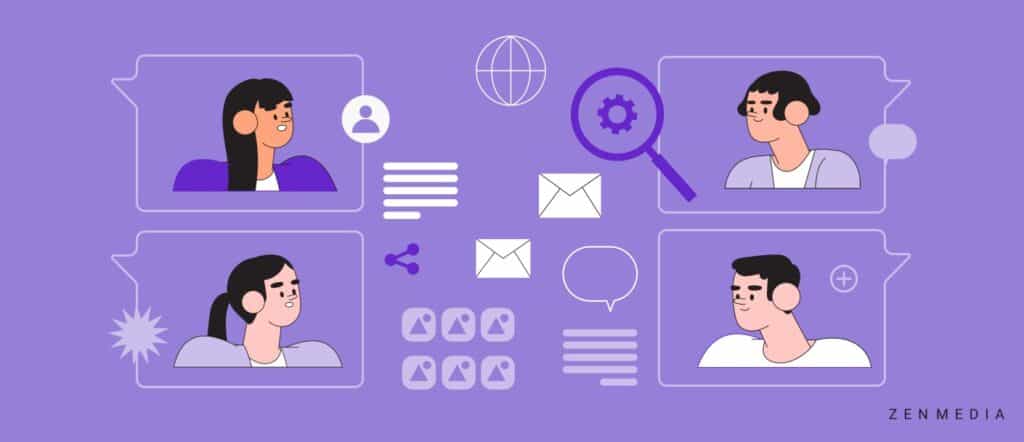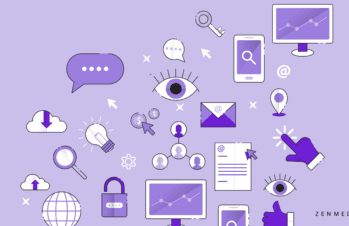AI technology is progressively reshaping the landscape of human interaction and decision-making, offering unparalleled efficiency, data-driven insights, and automation. It is quickly transforming the business landscape, with company usage in at least one area more than doubling from 20% in 2017 to a striking 50% in 2022.
However, as we fall deeper into the age of ChatGPT and other AI bots, we must remember the crucial element that sets humans apart from machines: emotional intelligence (EI). An overreliance on AI can minimize genuine human connections and diminish the value of emotional intelligence, especially in marketing. In turn, consumers feel like they’re being marketed at instead of marketed to.
Consumers yearn for authentic interactions with people and brands, making emotional intelligence indispensable in building trust and loyalty. But this is not to say that EI and AI are mutually exclusive concepts; rather, they offer a perfect blend of empathetic human interaction and data integration.
The Power of Emotional Intelligence in AI Integration
Though it may seem daunting, leveraging the combined effects of EI and AI is not only possible but incredibly effective in marketing tactics. Here are some strategies for integrating AI into your business model without losing the personal touch that brought your customers to your company in the first place:
Empathy Mapping
Effective marketing starts with knowing your audience, and the best way to keep track of who you’re targeting with your campaigns is through empathy mapping. Empathy maps enable marketers to design digital marketing campaigns that resonate on an emotional level, ensuring personalization and a human touch in communication. Your business can use AI to analyze customer data and behaviors to create these maps and to help understand the emotions, pain points, and needs of customers.
Personalized Behaviors
Like empathy mapping, responding to the unique and personalized behaviors of your typical consumer will elevate the impact and reach of your marketing. AI algorithms can track customer preferences, behaviors, and past interactions, which can be used to personalize your company’s marketing efforts. Adapt content, timing, and channels based on the customer’s specific needs and behaviors, but remember, personalization should feel genuine, not intrusive.
Emotion AI
Though it may seem obvious, another approach to incorporating emotional intelligence into AI technologies is to use AI specifically designed to provide empathetic customer service and response. Emotion AI is an artificial intelligence coded to understand and interpret human emotional signals and, in turn, adapt its output to conform to their tone. Using chatbots like this that understand and respond according to user emotions can enhance the customer experience while maintaining efficiency (more on this later!).
AI-Enhanced CRM
Did you know AI can be tied to your CRM systems? This is a fantastic hack to leverage the capabilities of AI to your benefit, retaining its efficiency without sacrificing the humanity of your marketing efforts. Try using AI to automate data entry and basic tasks, which will free up time for your sales team to focus on building meaningful, authentic relationships with clients.
Transparency and Trust
Trust is a significant component of emotional intelligence built through honesty and communication. The foundation for a strong business-client relationship is founded in this transparency, and that includes the use of AI in your deliverables. Be open with clients about your company’s use of AI in any or all of your processes, and be sure to educate them on why you’re implementing that approach. If clients understand how AI is used and how it benefits them, they’re more likely to trust your process, your business, and your expertise.
Data Privacy
With AI’s extensive capabilities, including data collection, comes the responsibility of protecting customer data. Ethical use of AI helps not only in building trust but in showing clients that they’re valued and respected. Adhering to data privacy regulations, such as GDPR, is also essential whether using AI or not.
How EI and AI Can Coexist in Your Business
When properly implemented, emotional intelligence and AI can complement one another in your business. This creates an ecosystem that leverages the benefits of AI in marketing while preserving the authenticity of human interaction.
Data-Driven Empathy
Who says emotions can’t be rooted in fact? Using AI’s ability to gather and analyze vast amounts of customer data, your business can actually enhance its emotional intelligence. Artificial intelligence provides us with deep insights into our clients’ behaviors, needs, and pain points. Armed with this information, we can approach client interactions with heightened empathy, understanding, and personalization. Who wouldn’t love that?
Predictive Analysis and Personalization AI
As we discussed earlier, AI can predict your clients’ preferences and behaviors, allowing you to tailor your B2B marketing strategies to each of their unique needs. This predictive ability, coupled with your employees’ emotional intelligence, will help you create campaigns that resonate on a personal and emotional level with your clients, and therefore drive revenue and client loyalty.
Emotion AI
Emotion AI can help you understand your clients’ emotional states during interactions, allowing you to respond empathetically and appropriately and combine AI and human intelligence. While it doesn’t equate to human interaction, it adds a layer of emotional awareness to our AI systems while keeping efficiency (see our in-depth discussion of Emotion AI below!).
Efficiency and Focus
At its core, AI automates mundane tasks, thus freeing up your team to focus more on building strong client relationships and strategic planning. By handling routine tasks, AI allows us to leverage our emotional intelligence more effectively by eliminating monotonous or time-consuming tasks. This allows us to focus on empathy, connection, and strategic decision-making in client-facing meetings and deliverables.
Emotion AI
Emotion AI, also known as affective computing, attempts to bridge the gap between human emotional intelligence and the seemingly cold logic of AI by using technologies to recognize, understand, and simulate human emotions.
The implementation of Emotion AI in personalized B2B content marketing can lead to:
Enhanced Customer Experience
Emotion AI bridges the gap between human emotional intelligence and AI’s logical capabilities. It is designed to detect and respond to user emotions in real-time, which can be applied in customer service chatbots, for example, to field customer complaints or adapt responses according to their emotional state. It’s a step towards humanizing AI and providing a more personalized customer experience.
Insights for Businesses
Analyzing data on customer emotions can lead to more informed decisions about product design, marketing strategies, and engagement, leading to better interactions with customers. In B2B marketing, this could translate into more effective engagement with business clients by understanding and responding to their needs better.
Brand-Consumer Relationship
Emotion AI can foster stronger relationships between brands and consumers by understanding and responding to consumer emotions, even in partially or fully automated interactions. This helps brands make their interactions feel more human and genuine, even if they are partially or fully automated, fostering stronger customer relationships and trust.
Balancing AI and EI
Emotion AI exemplifies how technology and emotional intelligence can be integrated. While it’s not a replacement for genuine human connection in business, it can complement human efforts, providing a balance between efficiency and personalization.
As technology advances, remember that emotional intelligence is the key to creating meaningful connections, both in marketing and elsewhere, that stand the test of time. Ensuring that human touch remains at the heart of every interaction regardless of AI’s advancements is at the heart of every effective marketing strategy.
Ready to level up your marketing efforts? Reach out.




